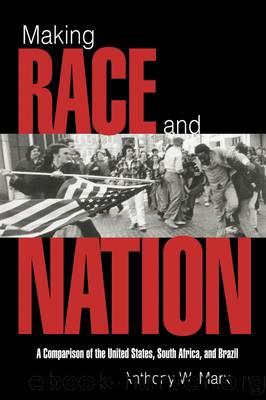Making Race and Nation : A Comparison of South Africa, the United States, and Brazil (9781139928489) by Marx Anthony W

Author:Marx, Anthony W. [Marx, Anthony W.]
Language: eng
Format: epub
ISBN: 9780521584555
Publisher: CambridgeUP
Published: 2007-09-15T05:00:00+00:00
Black Protest Forces Inclusive Nation-State Building
By the late 1980s, the confrontation between white racial unity and domination on one side and rising black unity and resistance on the other had produced a crisis. Black popular and labor mobilization had reached unprecedented levels, challenging the legitimacy and control of the nation-state and undermining an economy ever more dependent on blacks, mirroring the instability earlier intrawhite conflict had brought. To head off this rising challenge, ruling elites would abandon apartheid while hoping to preserve the polity, restore growth, and thereby retain long-entrenched white advantage. Other pressures and events were important, such as the end of the cold war, new leadership, and international sanctions. But geopolitical changes would have been less meaningful in South Africa without already rising black opposition within the country. Protest shook the economy, scared domestic and foreign capital, inspired the international pressure, and brought new leaders to the state. Disagreement over reform did not disappear, but protest forced fundamental change. The result was what the stateâs mainstream opponents sought, though the end of apartheid then brought new challenges to nation-state building.
The South African state was unable to contain the protests its own policies had provoked, as it wavered between reforms and repression.42 Former parliamentarian Helen Suzman describes the reaction: âFurther escalation of black resistance would have meant continuous repression. [The National Party] took the necessary steps to contain the rebellion. Some said we cannot keep doing this.â43 The stateâs military and repressive apparatus had remained strong, reinforced by ethnic loyalty among the armyâs officers, 85 percent Afrikaners.44 But this loyal force was unable to halt popular unrest, and the greater use of force only threatened further economic dislocation. Broederbond Chairman P. J. de Lange concedes that âthe unrest was importantâ in forcing a reconsideration of the viability of continued minority rule. And Beyers Naude adds that âthe 1980s couldnât have been avoidedâ and were needed for state âleaders to be confronted by the reality of the depth of black feelings.â45 Certainly the level of mass protest engendered by state repression shook the commitment to minority rule among many whites.
The central thrust of the UDF and related mobilization was a demand for inclusion in South African citizenship, unifying the opposition despite other disagreements. The state had set the agenda in excluding blacks from the new constitution and formal citizenship. Opposition movements rejected the creation of separate homelands, as they had rejected the tricameral constitution. Even within the homelands themselves, the artificial construct of non-South African citizenship was challenged. Most notably, the Inkatha movement in Kwazulu under Chief Buthelezi rejected formal independence, even as it distinguished itself from national black unity and movements.
Despite Butheleziâs rejection of independence, Inkatha distanced itself from mainstream opposition. Buthelezi himself had earlier been sympathetic to both BC and the ANC. But in accepting the government post of homeland leader he had shifted to a more ambivalent position toward the state, blurring the distinction between homeland semi-autonomy and formal independence. He now used patronage, and later coercion, to bolster his support, primarily among Zulus, with the state providing the resources.
Download
This site does not store any files on its server. We only index and link to content provided by other sites. Please contact the content providers to delete copyright contents if any and email us, we'll remove relevant links or contents immediately.
| Central Africa | East Africa |
| North Africa | Southern Africa |
| West Africa | Algeria |
| Egypt | Ethiopia |
| Kenya | Nigeria |
| South Africa | Sudan |
| Zimbabwe |
Goodbye Paradise(3810)
Men at Arms by Terry Pratchett(2838)
Tobruk by Peter Fitzsimons(2518)
Borders by unknow(2315)
Arabs by Eugene Rogan(2299)
Pirate Alley by Terry McKnight(2221)
More Than Words (Sweet Lady Kisses) by Helen West(1867)
Belonging by Unknown(1857)
It's Our Turn to Eat by Michela Wrong(1731)
The Biafra Story by Frederick Forsyth(1656)
The Source by James A. Michener(1613)
Botswana--Culture Smart! by Michael Main(1602)
Coffee: From Bean to Barista by Robert W. Thurston(1545)
A Winter in Arabia by Freya Stark(1538)
Gandhi by Ramachandra Guha(1532)
The Falls by Unknown(1527)
Livingstone by Tim Jeal(1489)
The Shield and The Sword by Ernle Bradford(1409)
Africa: Altered States, Ordinary Miracles by Richard Dowden(1385)
